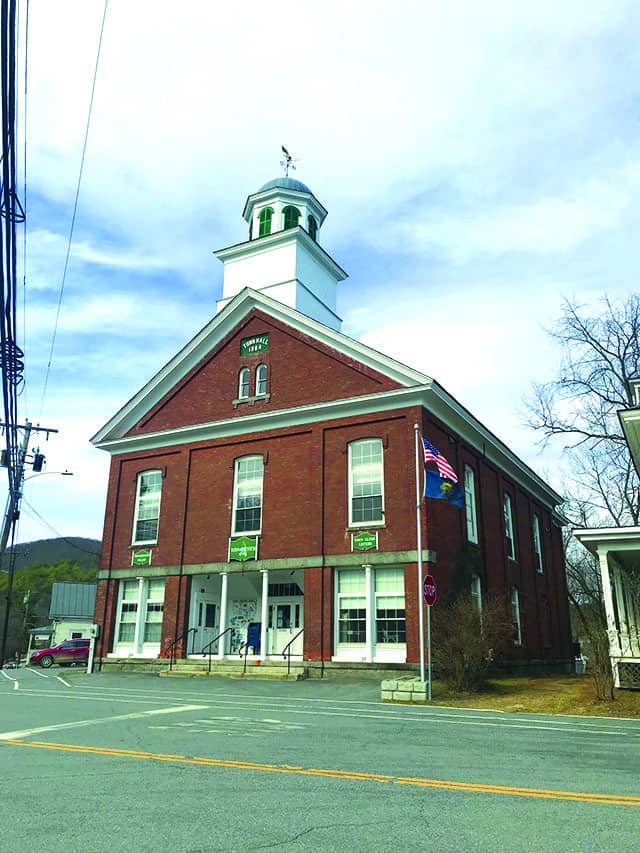CHESTER, Vt. – The Chester Selectboard meeting on Wednesday, Nov. 15, was preceded by a hearing on proposed amendments to the town’s Unified Development Bylaws, often referred to as “zoning modernization.” This zoning reform is being done in response to housing shortages, which are a problem across the state, as well as to the HOME Act, passed by the legislature during the 2023 state legislative session. The Chester Planning Commission has been working on updating Chester’s zoning bylaws since early 2022, and brought before the selectboard a number of changes intending to create opportunities for increased housing density, and more affordable housing.

“Single-family zoning on one-acre lots is sort of a thing of the past,” said Planning Commission Chair Hugh Quinn. “Lot sizes are shrinking, setbacks are shrinking, lot coverage is going up, and we’re basically adding more uses to each zone,” Quinn continued, noting that many added uses are conditional uses, which require a hearing before and approval from the development review board. All zoning districts which allow residential use now allow the construction of multi-unit housing. The full extent of the proposed bylaw amendments, as well as other information about the zoning changes and process, can be found at marcvt.wixsite.com/town-of-chester-unif. It should be noted that the planning commission has yet to address Chester’s rural district zoning bylaws, and as such no changes to this district were considered at this hearing.
The selectboard was broadly receptive to the changes, taking issue with several minor details related to specific cases – such as a zone border bisecting the town’s gravel pit – which necessitated further consideration. As such, the board will hold another hearing in the future, once the planning commission has been given an opportunity to address the board’s concerns.
The board then once again turned to discussing short-term rentals (STRs) in Chester. Town planner and zoning administrator Preston Bristow updated the board on the most recent STR data, saying that 49 of 68 identified STRs had fulfilled their registration requirements, netting $12,000 in registration fees. Six STRs had been sent both a first and second letter notifying them of the registration requirement, and failed to respond in the allotted time frame, putting them in violation. Of the 49 which had registered, 14 – 0r 29 % – are hosted STRs in which the owner or a caretaker is onsite while renters are present. The remaining 71% are unhosted.
Discussion then focused on the issues surrounding STR regulation. “The trouble I see with a conditional use is that in six weeks anybody can have a short-term rental,” said board member Peter Hudkins, “So I lean more toward you’re going to have to own the property for two years.”
“I think that…is a great idea,” replied Chair Arne Jonynas, “but I would also tack on a conditional use on it, so that the neighbors can hear what’s going on…and also maybe there’s a list of conditions…that have to be addressed.”
Several other possibilities were raised by members of the board, including conditional use in some districts and not others, and limitations on the percentage of dwellings which can be STRs in some zones. There has been continued concern about Chester’s historic Stone Village becoming overrun with STRs due to its prime location, unique architecture, and historical significance.
The board stressed that these requirements would not be imposed upon STRs that are already operational and registered, but only to those newly set up after the end of the six-month STR moratorium, which began at the end of October.
The board then heard from Frank Kelley, member of the citizens advisory committee, which serves as a liaison between Chester residents and the Chester Police Department, as well as other emergency services. Kelley informed the board that their flood response survey would be going out to the public in “the next week or so” in local media outlets.
Police Chief Thomas Williams was on hand to discuss with the board the proposed new false alarm policy, which would impose fines for repeat false, automated fire or security alarms. Williams told the board that 15-20% of such alarms are repeat alarms, and six locations have had four or more repeat alarms. These alarms result in fire trucks and/or police and ambulance personnel being deployed to the location of the alarm, and cost Chester’s taxpayers money. Williams said that often these homes are unoccupied for much of the year, and that despite repeat attempts by the police department to get owners to fix their alarms, they problem goes unaddressed, and the false alarms continue. The new policy would also require a $25 registration fee when registering alarm systems with the Chester Police Department. The hope is that the false alarm policy would result in less wasted taxpayer money, and incentivize property owners to address faulty alarms in a timely manner.
The Chester Selectboard will meet next on Wednesday, Dec. 6, at 6:30 p.m., at the Chester Town Hall.
CORRECTION: A previous version of this article state that the Chester Selectboard would next meet on Nov. 29. This is incorrect. Their next meeting will be held on Dec. 6.